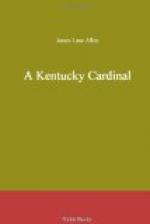The middle of February. The depths of winter reached. Thoughtful, thoughtless words—the depths of winter. Everything gone inward and downward from surface and summit, Nature at low tide. In its time will come the height of summer, when the tides of life rise to the tree-tops, or be dashed as silvery insect spray all but to the clouds. So bleak a season touches my concern for birds, which never seem quite at home in this world; and the winter has been most lean and hungry for them. Many snows have fallen—snows that are as raw cotton spread over their breakfast-table, and cutting off connection between them and its bounties. Next summer I must let the weeds grow up in my garden, so that they may have a better chance for seeds above the stingy level of the universal white. Of late I have opened a pawnbroker’s shop for my hard-pressed brethren in feathers, lending at a fearful rate of interest; for every borrowing Lazarus will have to pay me back in due time by monthly instalments of singing. I shall have mine own again with usury. But were a man never so usurious, would he not lend a winter seed for a summer song? Would he refuse to invest his stale crumbs in an orchestra of divine instruments and a choir of heavenly voices? And to-day, also, I ordered from a nursery-man more trees of holly, juniper, and fir, since the storm-beaten cedars will have to come down. For in Kentucky, when the forest is naked, and every shrub and hedge-row bare, what would become of our birds in the universal rigor and exposure of the world if there were no evergreens—nature’s hostelries for the homeless ones? Living in the depths of these, they can keep snow, ice, and wind at bay; prying eyes cannot watch them, nor enemies so well draw near; cones or seed or berries are their store; and in these untrodden chambers each can have the sacred company of his mate. But wintering here has terrible risks which few run. Scarcely in autumn have the leaves begun to drop from their high perches silently downward when the birds begin to drop away from the bare boughs silently southward. Lo! some morning the leaves are on the ground, and the birds have vanished. The species that remain, or that come to us then, wear the hues of the season, and melt into the tone of Nature’s background—blues, grays, browns, with touches of white on tail and breast and wing for coming flecks of snow.
Save only him—proud, solitary stranger in our unfriendly land—the fiery grosbeak. Nature in Kentucky has no wintry harmonies for him. He could find these only among the tufts of the October sumac, or in the gum-tree when it stands a pillar of red twilight fire in the dark November woods, or in the far depths of the crimson sunset skies, where, indeed, he seems to have been nested, and whence to have come as a messenger of beauty, bearing on his wings the light of his diviner home.




